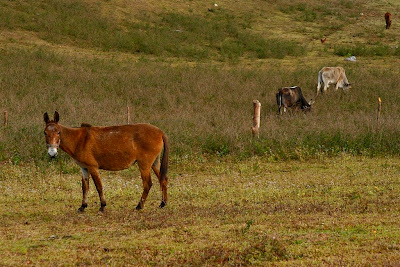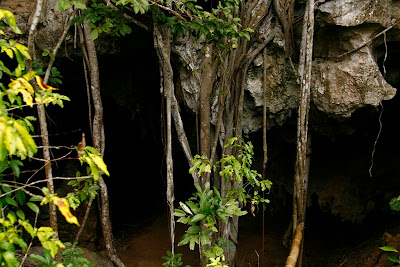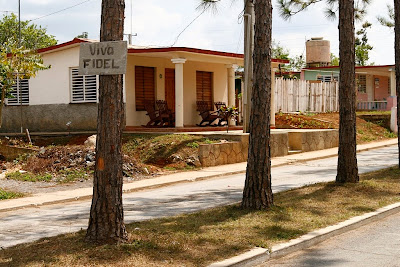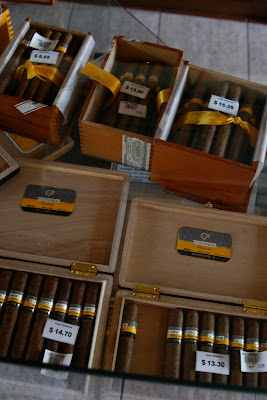I usually don't take organized tours or team up with fellow travelers, but in Viñales i decided to book through my casa particular a tour in the surrounding countryside and i must admit that it was a money well spent. I shared the tour with a French guy Jean Baptiste and it was a good luck of mine since his Spanish was way better than mine and the guide's English vocabulary was about on the level of that tobacco factory tour guide in Pinar Del Rio. The tour turned out to be 5 hour long walk in the surrounding neighbourhood covering among other things also some neighbourhood farms for illustrating how tobacco plants are being grown, leaves dried and cigars rolled. We tried local blend of coffee, grown and roasted right there in Viñales and the local type of cigars. When in Pinar Del Rio i saw how cigars were professionally made in the factory then in Viñales you could see the whole process from the farmer's side. Local cigars are meant mostly for the nearby area, not so much for export to other parts of Cuba.
 In the tobacco farm we were offered a 10-pack of local cigars for 20 CUCs. Considering that the quality of the countryside cigars is much lower than the ones from the factory, it seemed a bit high price. When the guy saw that his sales-pitch is not going well, he added another piece of information to seal the deal: in the town the same pack costs 70 CUCs. That was the final proof that the stuff is greatly overpriced, because if in the town these cigars really were sold for 70 CUCs, he would have absolutely no reason to give us so much discount. Jean Baptiste was later glad he did not buy any, because it came out that in the town the pack costs only 3 CUCs :). Oh that greed of men.
In the tobacco farm we were offered a 10-pack of local cigars for 20 CUCs. Considering that the quality of the countryside cigars is much lower than the ones from the factory, it seemed a bit high price. When the guy saw that his sales-pitch is not going well, he added another piece of information to seal the deal: in the town the same pack costs 70 CUCs. That was the final proof that the stuff is greatly overpriced, because if in the town these cigars really were sold for 70 CUCs, he would have absolutely no reason to give us so much discount. Jean Baptiste was later glad he did not buy any, because it came out that in the town the pack costs only 3 CUCs :). Oh that greed of men.As part of the tour we went into cave-tunnels, which was a super experience though made me feel like a cockroach in a dry and tight place. At some point the tunnel got so small that moving was possible only sideways and i could feel the beginnings of claustrophobia tingling somewhere in me. But it was still an awesome place, something you most definitely do not get to see or do in Estonia.
We had to cut our tour somewhat shorter than originally planned because the gathering rainclouds threatened to liquidate us and we were really far from the town. But as mentioned before - it was all in all a tour quite worth taking and that comes from a person who does not believe in guided tours. 10 CUCs per face.
The town's main square was generally an interesting place. The concentration of well-groomed and dressed people was very high. Let me rephrase that - not so much as "well" as fashionably dressed people. It seemed like it's "the place" for exhibiting yourself and establishing your presence among the hip & cool. On the night of the "Open Mic" concert, our tour guide Pancho was also there. Eager middle-aged man with a sizable belly, obviously spending the 20 CUCs me and Jean Baptiste had paid him earlier on the day. He was being a wealthy drunk for the evening, but even with all those free cervezas he was giving away left and right, he still didn't seem to score any. When he saw Jean Baptiste and me sitting and having mojitos together, he was of course absolutely delighted that we had "found each other" and he had been the catalyst. I almost chocked on a peppermint leaf and Jean Baptiste was highly amused. But it was a different kind of relaxed evening for me: while i was in Jean Baptiste's company, people assumed that we are "together" and nobody was annoying me with unwanted attention and him with other kind of offers. So it worked out well for both of us.
And the temporary-looking drink-stand on the main square makes very decent mojitos, 2 CUCs /a piece.

Our tour guide Pancho


Administering extra strength for the trees, looked very surreal though


A very typical local farmhouse


Tobacco plants growing on the field

A special building for drying tobacco. It has no walls, because the wind has to pass through the drying plants and air has to circulate

Drying tobacco leaves, it takes months for them to dry

Drying tobacco leaves close-up

A local farmer taking a nap under the drying tobacco leaves. They smell good, not like tobacco yet, but more like fresh hay. Any country-Estonian could relate

A local farmer in his home

He is showing us how to make a cigar from scratch

Pressing and rolling of the leaves


It was quite good and was said not to be addictive due to some special processing

Roasting coffee-beans and garlic in the hot sun

Local way of filtering the drinking water. They use a special stone for purification. When i asked how this stone is called, then nobody knew. They just know this type of stone as "stone that cleans the water"






Fresh fruit juice with a dash of rum



I'm ashamed to admit it but up to now i had no idea how a pineapple plant looks like. I was imagining more like a tree type of thingie ..







































